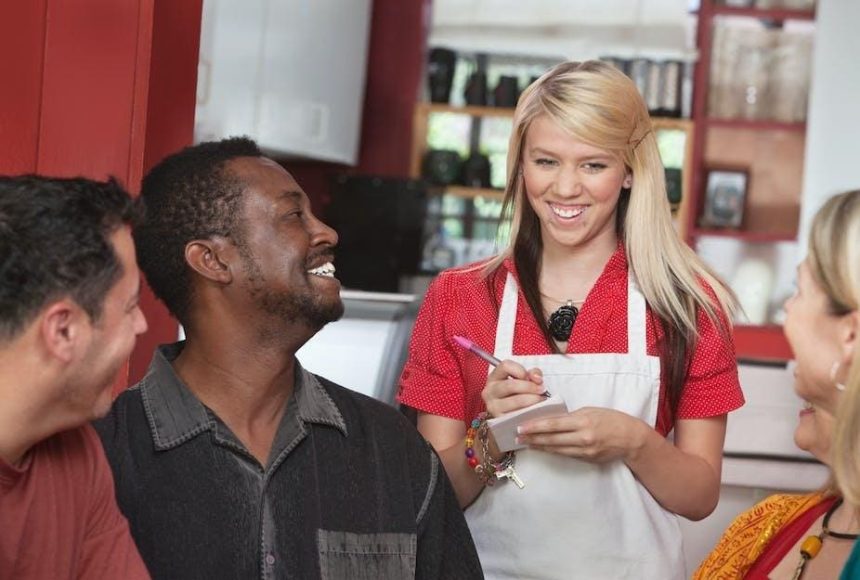I’ve done a good bit of reporting in recent weeks on accessibility and QR codes. The codes are nigh ubiquitous nowadays, mostly used as convenient carriers for pertinent information. As I’m often wont to say, although convenience and accessibility are close cousins, it’s easy to conflate the two. Everyone, regardless of ability, likes convenience—the salient point to remember, however, is what’s convenient for one person may be accessibility to another. It’s a nuanced point, but one worth reiterating again. QR codes have more value than sheer amenity.
GoTab founder and CEO Tim McLaughlin appreciates accessibility.
GoTab, which designs and develops point-of-sale technology for restaurants and bars, was founded in 2016 with the idea that it could reshape the hospitality industry. On its website, the company promises to help businesses “streamline your business operations” by way of making “ordering, payment and fulfillment more guest-centric and efficient.” In addition to the POS technology, GoTab offers what it describes as a “complete restaurant commerce platform” that includes a mobile order system, an online ordering system, and a kitchen display system meant to make expediting in the back of the house—the kitchen area, where food is stored and prepared—easier and more efficient.
In an interview via videoconference last week, McLaughlin explained to me that accessibility is something “near and dear to my heart.” At a previous company, McLoughlin had a colleague who had low vision. McLaughlin said this person, known as employee #8, had a “pretty big impact” on him and the rest of the team. They did a lot of accessibility consulting during that period, so accessibility is something McLoughlin has become intimately familiar with. He shared an anecdote about recently being at a restaurant, where he noticed a few diners—who weren’t disabled in the classical sense—use the flashlight on their smartphones in order to more easily read the menu in the darkly-lit environment. It shows that people appreciate accessibility; it’s the quintessential “accessibility benefits everyone” use case.
“[Accessibility is] something that we’re constantly looking at within GoTab,” McLaughlin said.
McLaughlin told me the more digital-first POS are nice for waitstaff in terms of accessibility, but the systems have downsides for the customer. The issue is, he said, the handheld computers pack a lot of information into a small space. The resulting small text size may not be readable to someone who has less than stellar eyesight. There has to be some flexibility to the technology such that it can be inclusive. It must accommodate a variety of needs and tolerances in terms of visual acuity.
McLoughlin is a believer that “accessibility benefits everybody,” he told me. The fact that he, and others, benefit from ever-larger text sizes as they grow older is proof that accessibility conceptually isn’t reserved solely for people like myself, who have lifelong physical conditions. More accessible ordering systems are part of that as well; scanning a QR code, for instance, may not be merely convenient—it may be more accessible for someone with aging or fatigued eyes than needlessly and unhealthily straining to read a menu hanging high up on a wall somewhere.
McLaughlin told me GoTab considers colorblindness in its product designs as well. Given the statistics that one in five males experience some form of colorblindness, he said, “one of the things we will never do is use color as an indication of status” because 20% of men will find it inaccessible. He said a nuanced aspect of good, thoughtful design is nuanced points like this; to that end, GoTab has made it standard practice to use other visual indicators to signify status since they know relying on color alone is problematic. “If you do good design, it’s easier for programmers who are thinking about it or easier for systems that aren’t thinking about it,” McLaughlin said. “I have to admit [accessible design] is not a primary focus [of our customers], because unfortunately restaurants aren’t super attentive to accessibility any more than they have to be. I will say it’s ours for dual reasons. One is we care. The other one is, it does benefit everybody with variable sensory abilities.”
Circling back to what I wrote at the outset, McLaughlin married GoTab’s mission with the needs of those in the disability community by saying “improving convenience for everybody increases accessibility as well.” He went further, likening convenience and accessibility to two sides of the same coin. To wit, GoTab’s tools make eateries more efficient and convenient to employees and customers alike—but they also have massive accessibility benefits to boot. On a more existential point, McLoughlin said that, after reading up a lot on evolutionary anthropology, it’s interesting to ponder what the ever-burgeoning application of technology in an industry that has traditionally been defined and dominated by human interaction. He feels, like with the work shift, there will exist a hybrid model. Hospitality needs human beings as a social-first industry, but technology does and will continue to have a role. Make no mistake, technology makes the customer experience more accessible for myself and others like me.
“One thing I often say is no one ever commented about a server, ‘Wow, they were really good at splitting checks.’ It has never happened,” McLaughlin said of human connection and technology co-exisiting. “There’s a lot of stuff in hospitality that has no huge benefit to human interaction. There’s a lot of stuff that does. My hope is we get more time to spend on the things that do benefit from human interaction.”
Read the full article here










